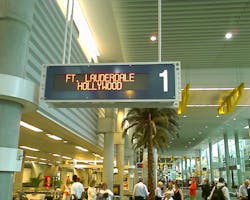Aug. 08--Despite a "living wage" policy in Broward County, minimum wage remains the reality for many workers at the Fort Lauderdale-Hollywood International Airport. Some wheelchair attendants and baggage handlers make even less than minimum -- $4.91 an hour, not including the tips that are few and far between.
"It's pretty much a never-ending race, trying to live off the money we get paid," said Trey Archer, a wheelchair attendant and sometimes supervisor at the airport.
The pay gap exists because Broward's 12-year-old law only applies to workers directly employed by the county. Subcontractors that provide services for airlines don't have to abide by it. And workers classified as "tipped" employees can receive below minimum wage under federal law.
Once paid at the bottom of the scale, Archer actually got a boost to the $7.93-an-hour minimum wage in January after several airlines pressed subcontractors to raise their pay. Even so, his rate still remains less than half of what janitors, security guards, clerks and others earn under the living wage law at the county-owned airport.
Over the last few years, the South Florida local of the Service Employees International Union has been fighting, along with other branches across the country, for better wages for all airport workers.
Helene O'Brien, director for the Florida 32BJ SEIU chapter, said the problem is that subcontractors compete in a "race to the bottom" to win contracts with airlines -- and the cost-cutting comes out of paychecks.
"Nationally, these are pretty much universally the worst jobs around," O'Brien said. "The whole purpose of investing in airports is to create economic activity that benefits the local community -- that's why they're publicly owned and publicly run."
The union reports there has been some progress over the last year. Low wage rates were more widespread at the airport until January, when Delta and Southwest Airlines prodded subcontractors to improve pay.
But the union says about 100 workers who assist disabled and elderly passengers and help arriving passengers bring luggage to their cars still pull in less than minimum wage.
Prime Flight, a United Airlines subcontractor, and AirServ, a contractor for Jet Blue, still pay their employees $4.91 an hour, according to Julie Karant, communications director for the Florida SEIU chapter, with some AirServ workers receiving $5 or $6 hourly. According to a Massachusetts Institute of Technology living wage calculator, anything at or below $5.21 ranks as a poverty wage in Broward, and $11.72 is required for a single adult working full-time to support himself.
Under federal law, if an employee's tips don't bring him or her up to minimum wage, the employer is supposed to make up the difference. But the union says that's not happening.
Broward's living wage law, by comparison, requires county employees at the airport make at least $11.46 an hour with benefits, or $12.95 without benefits. And workers in similar positions at Miami International Airport are paid the Miami-Dade County living wage, $14.27, according to Karant.
By the union's estimate, it is only a relatively small group of wheelchair attendants and baggage handlers being paid at or below-poverty wages. But in winter, peak season at the airport, there are 1,500 employees -- cabin cleaners, ramp workers, passenger assistants and aircraft fuelers, among others -- of 39 subcontractors at the airport being paid minimum wage, which is not enough to support themselves, let alone their families, union leaders say.
Still, in late June, faced with the possibility of work stoppages by unhappy airport workers, the Broward County Commission passed a bill that would allow the county to void employers' contracts with the airport if workers went on strike. The union advocated for the bill, saying it would pressure subcontractorsto improve conditions for workers, but O'Brien said it's too early to know if the legislation is working.
Meanwhile, airlines say they have no responsibility for the actions for another company. United Airlines referred questions about wages to its subcontractor, while JetBlue said in an email that it works with local partners to "ensure they comply with applicable state and local wage laws for their employees."
"Airlines have hundreds of contractors with whom they do business, including travel agencies, aircraft manufacturers, security companies, petroleum companies and countless others, and no company -- in any industry -- dictates to its vendors what their employees should be paid," a spokeswoman for airline trade association Airlines for America said in an email.
Changing minimum wage and investigating violations of wage laws is the responsibility of federal and state governments, the group's email said.
In the meantime, even airport workers like Archer, who saw his pay raised to the minimum wage level, say they are struggling.
Even though he's single and doesn't have a family to support, Archer said he's barely scraping by, and more often than not he finds himself "pinching nickel and dime from friends and family." His supervisor shifts, which pay a dollar more an hour than minimum, lighten the load a little. Many of his coworkers with families have two or three different jobs, juggling different uniforms and heading to the next job once they finish a shift.
As a wheelchair attendant, Archer assists blind or physically disabled passengers to and from airplanes and helps them with their bags. Unlike airport skycaps -- who check in passengers happy to provide healthy tips to skip long lines at the ticket counter -- he said he routinely doesn't collect tips. At most, he said, he's received $5, but often it's a handful of change or nothing at all.
Still, Archer said he takes satisfaction in his work.
"Even when the passengers don't tip us or don't say, 'Thank you,' I still take pride in being able to assist passenger from point A to point B in a safe and timely matter," Archer said. "That is something I do take pride in."
Copyright 2014 - The Miami Herald

